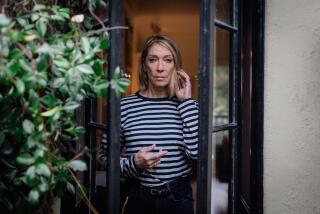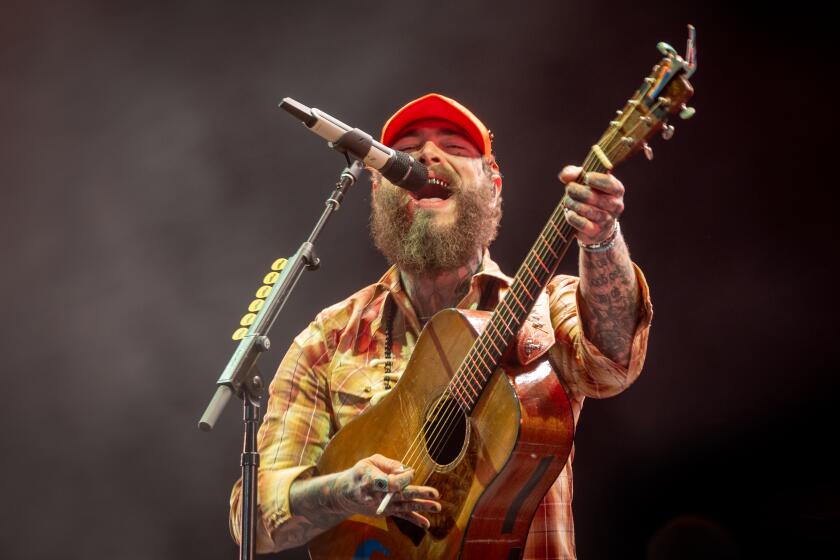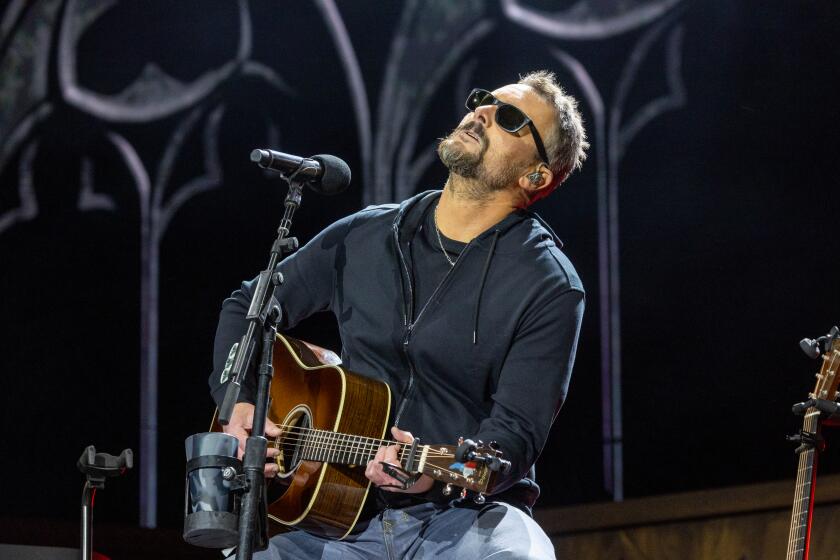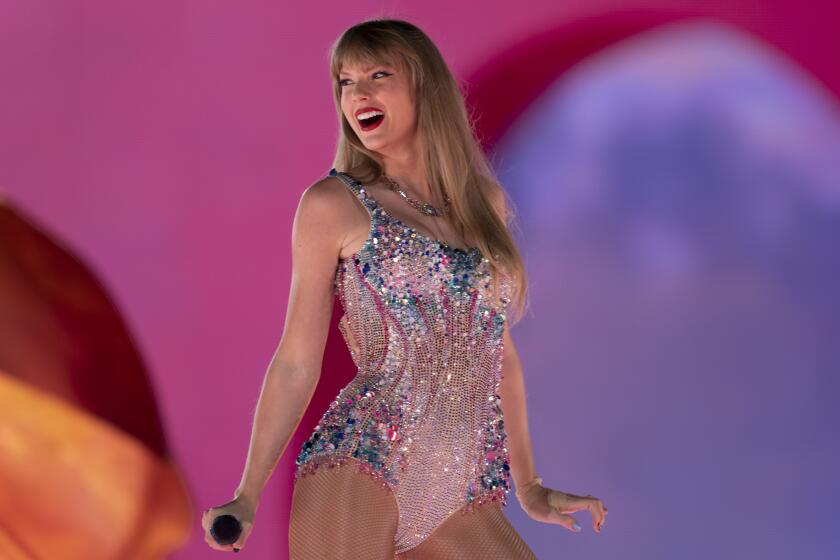Kamasi Washington expands jazz’s boundaries on new album ‘The Epic’
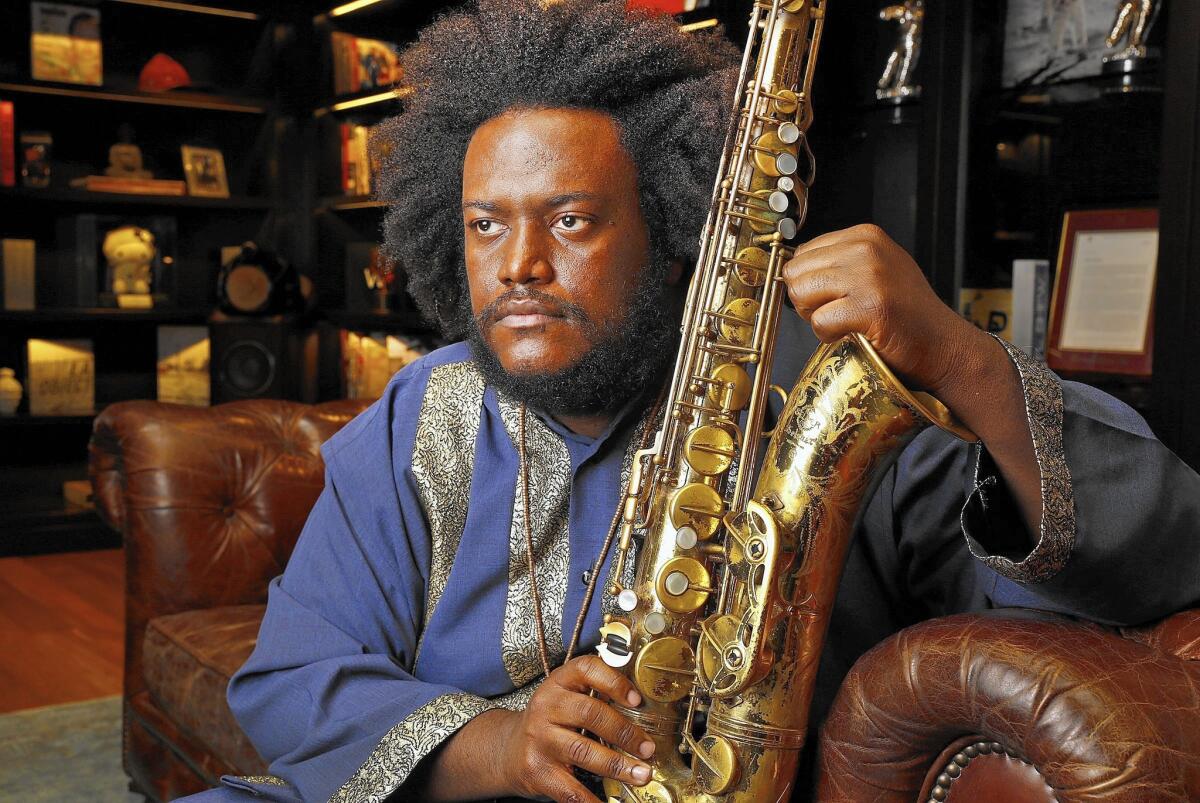
When jazz saxophonist Kamasi Washington was contributing string arrangements to rapper Kendrick Lamar’s “To Pimp a Butterfly,” few could have predicted that both L.A. artists would end up dominating the conversation about hip-hop and jazz in 2015.
But Lamar’s album, released this spring, has earned widespread acclaim for expanding the boundaries of rap, a genre that’s easy to pigeonhole for those who follow only the mainstream.
Washington is earning similar raves for his explorations on “The Epic,” a bold, three-disc statement that features a 10-piece band, a 20-person choir and a 32-piece orchestra. The album comes out Tuesday on L.A.’s Brainfeeder label, and Washington will celebrate the release Monday with a show at the Regent Theater.
Though the records appear to reside on different sides of the musical spectrum, they’re connected by a shared commitment to independent, artistic vision, forward-looking blends of sound and far-reaching narratives that push against genre constraints.
They’re also linked by a shared band of tightly knit L.A. artists who appear on both albums, including brothers Ronald and Stephen Bruner (the latter better known by his stage name Thundercat), Miles Mosley and Ryan Porter.
Together, the records point to a long-gestating high point for creative music coming out of Los Angeles, and the rest of the world is taking notice.
“In general in L.A., there’s a movement of sincere music that’s just people expressing who they are. That’s what I got from Kendrick when I went to hear his album,” said Washington, 34, speaking at his management’s lushly appointed offices in Culver City. “He wasn’t concerned with anything but doing music he thought would be great. That was the same outlook when I was making this record.
“I want to make the music that I hear in my head, it’s just purely what is in me.”
Some coverage of Washington’s rise to national attention has come with a faint air of surprise, as if it were impossible for a jazz artist to release such a fully formed opening statement without first being vetted by the music’s vaunted New York City gatekeepers. Washington is quick to cite L.A.’s long and storied jazz history, and he doesn’t mind having flown under the radar.
“In some way, that’s a bit of a blessing. I feel like that’s part of the reason it’s so organic, it’s so raw, it’s so pure,” Washington said of the music coming from him and his longtime friends, adding that the lack of outside pressure helped them remain free of anyone else’s expectations.
“In L.A., I don’t know if it’s because the sun’s always out, but we’re not paranoid about that,” Washington said. “We just do what we do.”
The son of saxophonist Rickey Washington, Kamasi grew up in Inglewood and has been playing with many of his bandmates since childhood. He attended Hamilton High School Academy of Performing Arts, and also studied under Locke High School educator Reggie Andrews in the L.A. Multi-School Jazz Band, a longtime incubator for South L.A. talent that has included members of the Pharcyde as well as Patrice Rushen and Ndugu Chancler.
Washington lived close enough to walk to Billy Higgins’ vaunted musical hub the World Stage in Leimart Park, and he would catch rides home from a young bandmate, Terrace Martin. A fellow saxophonist, Martin co-produced “To Pimp a Butterfly” and pulled him into the sessions after hearing early masters of “The Epic.”
“He played a couple of songs, and they had these amazing string arrangements, really cinematic, 3-D-sounding string arrangements,” Martin said. “I was confident he was the man for the job.”
Washington went on to study at UCLA, where he was mentored by revered bandleader Gerald Wilson, who asked him to join his band when he was just 19. “Kamasi’s in a world of his own,” said Wilson, who beamed while marking Washington as a talent to watch during a 2012 conversation. (Wilson died in 2014 at age 96.)
“It was like a first-hand experience through the history of music with Gerald. He really understood what was happening now in music as well,” Washington said, adding that he credits Wilson for encouragement to use a string section after an early show with his electric band, the Next Step. “He was definitely a powerful, powerful human being.”
While at UCLA, Washington was tapped to tour with Snoop Dogg through another connection with Martin. Though the rapper has long maintained a laidback public persona, Washington remembers him as an exacting bandleader for a tack-sharp group of young jazz players.
“He knew how good we were, so he’d just call stuff out in front of 60,000 people,” Washington remembered. “‘Let’s play this Rick James song that I was listening to in the dressing room 20 minutes ago’ — at the show.
“I learned a lot on that level, musically. The whole notion of jazz being the more intellectual music is not really true... These [hip-hop] dudes, they hear rhythm with a sense of detail that a lot of jazz musicians are not privy to.”
After years building a local following as a sideman and a leader, Washington entered the studio in 2011 with the same group of longtime friends. Their goal was to record as much music as possible over a month’s time. According to Washington, a staggering eight albums and 190 songs were recorded among the various ensembles, including 45 tracks of his own. From there the editing process for “The Epic” began.
“Trying to reduce it to an album took me awhile. I felt like all 17 of those songs, there was nothing I wanted to change about any of those,” he said. “And it was weird, I started having these dreams and the album was playing out through the dream. And I came to this conclusion — these were supposed to be together, this was it.”
The result is an ecstatic, urgent swirl of jazz, funk and cosmic gospel that balances individual fireworks from some of L.A.’s top jazz players with airtight interplay. Other than a soulful take on Ray Noble’s “Cherokee” as well as a song each by Terence Blanchard and Debussy, the album sets aside familiar covers for Washington’s original compositions.
“There’s a lot of pressure in jazz to express the lineage of the music, because it has such a rich lineage,” Washington said. “And I love it, I love ‘Trane, I love Bird, I love Gene Ammons, I love Wayne Shorter ... But if I’m going to somehow display my mastery or knowledge of that vast group of musicians, how much room is there really left for me?”
Over 172 minutes, “The Epic” revels in an array of styles, at times capturing a meeting point between John Coltrane and Stevie Wonder, with each musical element on equal footing. Sometimes, such as on “Final Thought,” Washington’s flame-throwing saxophone takes the lead, while on “Re Run Home,” the focal point is an unstoppable Afrobeat groove. On “The Rhythm Changes,” it’s the soaring vocal of Patrice Quinn.
Anchored by a loose narrative about a warrior’s journey and a changing of the guard, the album’s penultimate track, “Malcolm’s Theme,” reveals a socially conscious center. Recasting Ossie Davis’ eulogy for Malcolm X through an ethereal vocal melody, the song gives way to a plea for understanding drawn from a speech by the civil rights leader from 1965.
“To me, it’s an album that’s needed right now. It’s a very intense, yet gentle album,” Martin said. “His record is right on time.”
Washington said of the sessions, “I was pushing [the band] — put more of yourself, go further, play something I’ve never heard you play before. I just really wanted it to feel free and open and just like an expression of who we were and what we are.
“It wasn’t to replace anything,” he added. “John Coltrane didn’t replace Coleman Hawkins. He just displayed who he was. The universe is a vast, vast place. There’s room for everything.”
------------
Kamasi Washington’s ‘The Epic’
Where: The Regent Theater, 448 S. Main St., Los Angeles
When: 8 p.m. Monday
Cost: $23 to $33
Info: https://www.theregenttheater.com
More to Read
The biggest entertainment stories
Get our big stories about Hollywood, film, television, music, arts, culture and more right in your inbox as soon as they publish.
You may occasionally receive promotional content from the Los Angeles Times.
